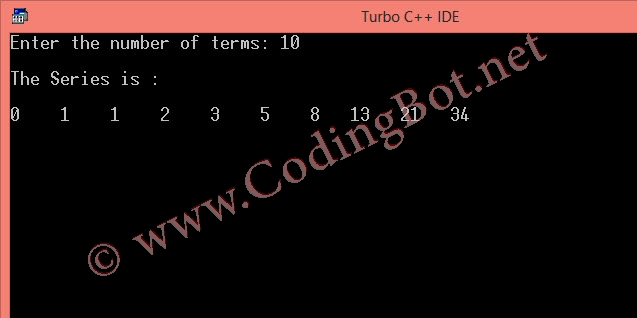Like Us On Facebook
Follow Us On Twitter
Drop Down Menu
Wednesday 24 April 2013

Inheritance And Its Types In C++
Saturday 6 April 2013

C Program To Generate Fibonacci Series
Hi Friends,
Today, we'll learn how to generate a Fibonacci Series using C. The program and concept are pretty simple. But before that, let me tell you what exactly is a Fibonacci series. Fibonacci series is a special series in which the first two numbers in the Fibonacci sequence are 0 and 1, and each subsequent number is the sum of the previous two. By going this way, the series generated will be:
Today, we'll learn how to generate a Fibonacci Series using C. The program and concept are pretty simple. But before that, let me tell you what exactly is a Fibonacci series. Fibonacci series is a special series in which the first two numbers in the Fibonacci sequence are 0 and 1, and each subsequent number is the sum of the previous two. By going this way, the series generated will be:
0, 1, 1, 2, 3, 5, 8, 13, 21, 34, 55, 89, 144 and so on...
The program is very simple.
First input is taken from the user that tells how many terms of the Fibonacci series will be generated and then as described above, a function is called in a loop to add the previous two numbers and generate the next number in the series.
First input is taken from the user that tells how many terms of the Fibonacci series will be generated and then as described above, a function is called in a loop to add the previous two numbers and generate the next number in the series.
Here is the C Code for Fibonacci Series:
/* Double-Click To Select Code */
#include<stdio.h>
#include<conio.h>
int fib(int n)
{
if(n==1||n==2)
return 1;
else
return(fib(n-1)+fib(n-2));
}
void main()
{
int i,n;
clrscr();
printf("Enter the number of terms: ");
scanf("%d",&n);
printf("\nThe Series is : \n\n0");
for(i=1;i<n;i++)
{
printf("%5d",fib(i)); // fib Function Called
}
getch();
}
Subscribe to:
Posts (Atom)



